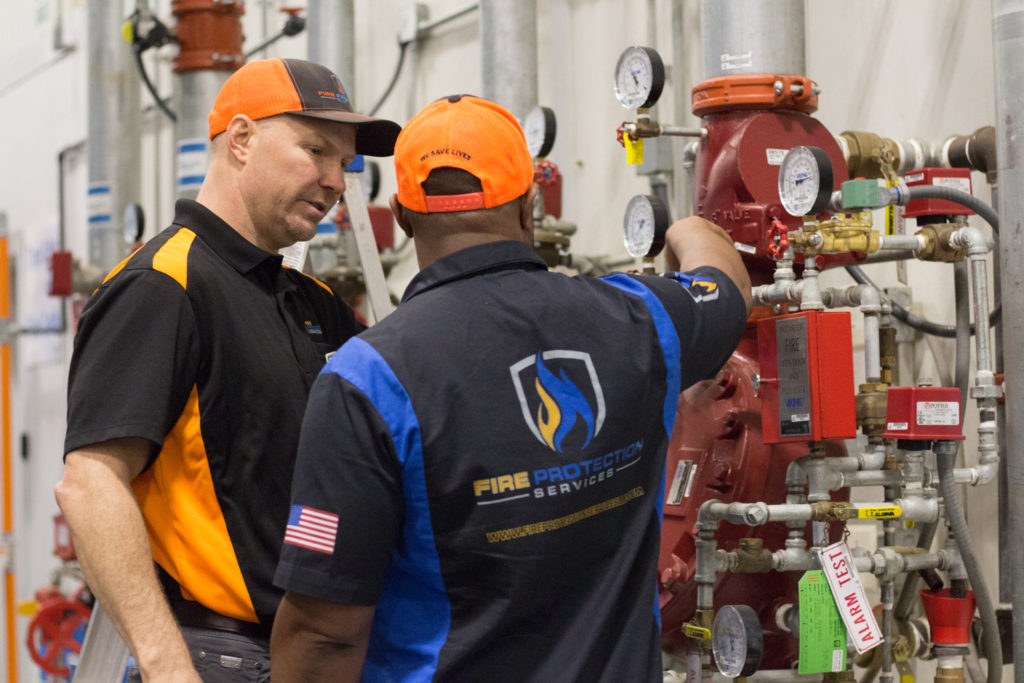05 Dec 5 Things All Georgians Must Know About Sprinkler Winterization

Fire Protection Services Offers Fire Sprinkler Winterization and Inspections for Commercial Buildings throughout North and Central Georgia, including Atlanta, Perry, Warner Robins, Macon, Athens, Columbus, and more.
Are your building’s fire sprinkler systems ready for winter?
Our state’s climate is generally mild year-round so many Georgians don’t dread the words “winter is coming.” Many building owners fail to prepare for the freezing temperatures by conducting any number of extensive “sprinkler winterization” procedures as undertaken by those living up North.
Yet, it’s barely December and Georgia temperatures have already dropped below freezing! You better believe that we’ll see more extended doses of freezing temperatures this year, which makes it imperative to make sure that the extreme cold is not going to compromise your fire and life safety systems.
Unfortunately, many people treat fire sprinklers as an out-of-sight, out-of-mind afterthought that only garners attention when something happens, such as freezing temperatures damaging the system. Every winter, Fire Protection Services gets well over a dozen service calls to repair frozen fire sprinkler systems. This problem could easily be avoided with annual fire sprinkler winterization procedures.
To help your building avoid winter-related problems, here are 5 things every Georgia business owner should know about fire sprinkler winterization:
1. Fire Sprinklers in Unoccupied, Semi-Exposed Facilities at Most Risk
Fire sprinkler systems in occupied buildings usually aren’t impacted by winter’s freezing temperatures in Georgia, because they remain sufficiently heated. During cold snaps in Georgia, freezing typically impacts unoccupied warehouses, parking garages, and similar facilities that might be minimally heated or partially exposed to the elements. Sometimes business owners just forget that their systems might get exposed to freezing temperatures, while some just assume that the system will naturally protect itself from the elements. The latter case typically includes business owners with fire sprinkler systems that rely on antifreeze. And while such systems are generally reliable, they do require maintenance and inspection.
2. Winterizing Needed for Both “Wet” and “Dry” Systems
The cause of damage due to the freezing of “wet” (water-based) fire sprinkler systems is obvious. The water in the system freezes and swells within the pipes, especially at the fittings, and bursts them when it thaws. Additionally, frozen water in sprinkler heads can push or blow out the brass element from their fittings during the thaw, leading to a leak from the head.
What many people don’t realize is that such freezing can also occur in “dry” (chemical-based) fire sprinklers, as well, because of water condensation in the pipes and system. Thus, winterization of dry fire sprinkler systems is just as crucial as it is for wet systems.
3. Winterizing Your “Wet” Fire Sprinkler System
Winterizing a wet fire sprinkler system entails a complete inspection of the system that makes sure the riser room receives adequate heat and that no portion of the system’s lines is exposed to cold air intrusion. This latter detail may lead to the need for more insulation or other remedies, such as heat tape, to keep semi-exposed pipes from freezing. Those systems relying on an antifreeze loop, need to be tested to ensure the antifreeze is at the correct viscosity.
4. Winterizing Your “Dry” Fire Sprinkler System
The primary detail involved with dry system winterization is removing any water condensation build-up from the pipes, which entails, among other things, releasing such water from the low point drains. During this process, the technician also inspects the pitch and angle of the pipes to ensure proper condensation buildup flow towards the drainage pipes. Pipe insulation is also inspected for adequate coverage and the electric power to heat tape tested.
5. An Ounce of Prevention. . . .
The adage that an ounce of prevention is worth a pound of cure holds especially true with fire sprinkler winterization. The small cost and ease of annual winterization is nothing when compared with the possible damage caused by freezing of the system, or, even worse, the potential failure of the system’s ability to suppress a fire. Ice in the pipes and/or sprinkler heads represents blockage, which could prevent your system from successfully carrying out its fire suppression role.
Turn to Us for Your Fire Sprinkler Winterization Needs
Fire Protection Services LLC offers fire sprinkler system winterizing as part of its inspection service or as a stand-alone service. FPS technicians take a proactive approach to winterization by always recommending sprinkler winterization whenever they see a system that may be prone to freezing. FPS technicians also pay close attention to how freezing temperatures might affect dry systems because they tend to be more “temperamental” with regard to cold weather. FPS takes that extra step to educate its customers because winterizing can save a lot of heartaches, and save money on potential damages and repairs.
As a full-service fire and life safety system inspection, testing, and maintenance business, Fire Protection Services’ technicians are licensed and certified to inspect, test and maintain:
- Fire Sprinklers
- Fire Alarm Panels
- Portable Fire Extinguishers
- Kitchen Hood Suppression Systems
- Hydrants and Backflow Prevention Equipment
- Fire Pumps
If you’re located in Georgia, call us today to schedule a visit from one of our licensed and experienced technicians.
For Atlanta and North Georgia, call 770-637-1042.
For Perry and Central Georgia, call 478-324-8626.

